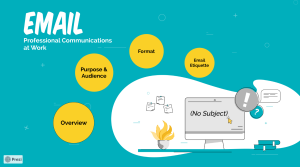11 Professional Emails
Learning Objectives
-
Practice the skills for writing professional communications in college and in the workplace.
-
Develop skills to communicate, collaborate, solve problems, learn and demonstrate creativity using technology.
Chapter & Discussion
This chapter includes a presentation that can be navigated in a classroom setting or independently. You can access the presentation via the link below.
Email: Professional Communications in College and the Workplace
Work through the different sections of the chapter and discuss ideas and topics as they arise. If you’re working independently, take notes instead. Notes and active discussion will be helpful in navigating this week’s assignments.
Overview
Email communication is used in every field. It is one of the most common ways you will send messages to colleagues, supervisors, and clients. These are all people you want to make a good impression on.
Unfortunately, it’s easy to be misunderstood in this form of communication.
Learning the professional email format, how to meet the needs of your purpose and audience, and understanding email etiquette can all help you become a strong communicator in the workplace.
According to the Indeed.com Career Guide, four qualities of a professional email communication are:
- Be firendly
- Be clear
- Be concise
- Be actionable
Why do you think they chose these qualities?
Purpose and Audience
All writing requires you to evaluate your goals before you start.
An email is a perfect example of how to do this, because it is a highly goal-oriented form of writing.
The best and easiest way to identify your goals is to evaluate your purpose and your audience.
Purpose
To identify the purpose of your email, consider the following questions:
What specifically are you trying to accomplish?
How would you like your recepient to respond?
Do you want to include a call to action?
What is your ideal outcome in this interaction?
Remembering your purpose can keep you on target when you are writing.
Audience
Knowing your audience is important to all writing. When you write, ask yourself:
What is my professional relationship to the recepient?
What tone is appropriate for this recepient?
How would this person like to be addressed?
How do I want this person to see me?
As you write, try to fine tune the
writing to this specific person.

Format
Subject Line: A short headline about the topic of your email
Salutation: Your greeting to the recepient
Body: Typically one or two paragraphs where you share the message you are trying to convey
Closing: A final one-two sentences to say how you’d like to continue this communication
Salutation & Signature: Your goodbye and some information about who you are.
Example
Re: New Position at Aperture Science
Dear Dr. Wheatley,
Thank you for your consideration of me in the role of Test Coordinator at your incredible organization. I truly enjoyed the tour today and believe that you are doing important work at Aperture.
If possible, I’d love to follow up and see if I might be a good fit for the Test Coordinator position. I’d be available by phone or in person anytime during the next two weeks.
I truly appreciate your time and consideration.
Sincerely,
Chell Corieander
Data Engineer
602-885-3210
c.corieander@gmail.com

Email Etiquette
Email is a relatively new form of communication, but it has developed its own code of professional conduct during its life. Here are a few things to remember:
Email is almost always formal communication, make sure to speak to the recipient as though you were in the classroom, the courtroom, or on the news
Proofread your email for conventions errors- these can be embarrassing
Double check the recipient, whether you spelled their name correctly, and whether or not you attached any files
Get a good signature and professional email address
Assigned Reading
Here are this week’s readings. Additionally, please read for your own personal enjoyment for 1/2 hour each day. This will be called your “Reading Zone” reading and it will coincide with many upcoming activities.
The Secret to Business Writing by Evelyn Ngugi (via Crash Course)
How to Write a Professional Email by Jennifer Herrity (via Indeed)
Problem Set: Practice Your Skills!
Click here to complete a ten-question problem set on concepts in this chapter.
Completing problem sets like this can be an important element of independent study towards completing your HSE. I write these to resemble the style of questions you’ll find on the Reading and Language Arts GED.
Assignment: Professional Email (250 Words)
Imagine you have just taken a tour of your dream workplace. You’ve checked to see if they’re currently hiring, but can’t find any listings. However, the manager mentioned that they’re “always looking for talent” and “could use a person like you.”
Send an email to this manager thanking them for the tour and inquiring about possible opportunities. Use all of the etiquette and formatting notes in the video and article above. Include details about this specific workplace and the experience you imagine from your tour.
Assignment: Reading Zone Response (250 Words)
For Reading Zone, you must find a novel that is interesting to you and enjoyable to read. If you need help finding a Reading Zone book, please ask. Please read your Reading Zone book for a half-hour each day. On class days, there will be time in class dedicated to reading.
Create a response to this week’s reading that addresses the following prompts:
-
In one paragraph, summarize what you’ve read this week
-
In a second paragraph, discuss imagery and descriptive passages used in your book. How are they helping your author?


